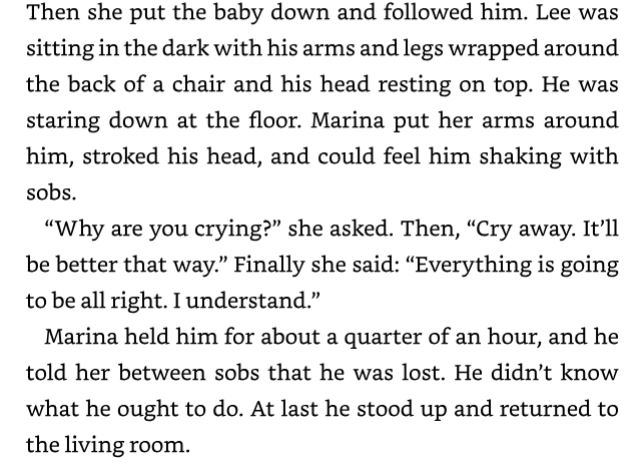Being bored and dissatisfied about life, believing you're not being properly recognized, is not for me in any way the same as having an unstable life. How is that instability?
He had an unstable life in the US: he was desperately poor, he couldn't hold a job, he was always failing, he had to rely on unemployment checks or the charity of others, the family spent long periods living apart. He complained bitterly to Michael Paine about the unfairness of America, about how workers were exploited. *That's* an unstable life. It was here that his life disintegrated.
Here is Marina, when in New Orleans, finding him in the kitching weeping and sobbing in despair.

Nothing like this was taking place in Minsk. Boredom, feeling not being properly recognized is one thing; not being able to fundamentally get by in life - feeling totally lost with no purpose and future - is a completely different one.
The distinction I'm making is that his external circumstances were irrelevant. As I said, he had in the USSR what might look to you or me like the trappings of a stable life but was not for Oswald because he was fundamentally unstable. Both the USSR and the US failed to fulfill his delusion that he was a brilliant intellect destined to be a Great Man of History. He went to the USSR with the hope and expectation of becoming a major figure and returned to the U.S. with the same delusional hope and expectation, preparing for the hordes of reporters whom he thought would be waiting at the dock. Neither hope panned out, leaving him only with the delusional hope that his destiny would be achieved in Cuba. When Mexico City didn't pan out, the delusion suffered another blow.
I believe this is why you see his dissatisfaction in Minsk as a mystery. You're not looking at it through the eyes of someone who thinks he's been destined by fate to be a Great Man in History. Minsk was as big a blow to this delusion as was the U.S., even though the external circumstances were very different.
Back at ya with Marina:
Mr. RANKIN. Was there anything said about the United States--not liking the United States?
Mrs. OSWALD. No. I can't say---he liked some things in Russia, he liked. some other things here, didn't like some things there, and didn't like some things here.
And I am convinced that as much as he knew about Cuba, all he knew was from books and so on. He wanted to convince himself. But I am sure that if he had gone there, he would not have liked it there, either. Only on the moon, perhaps.